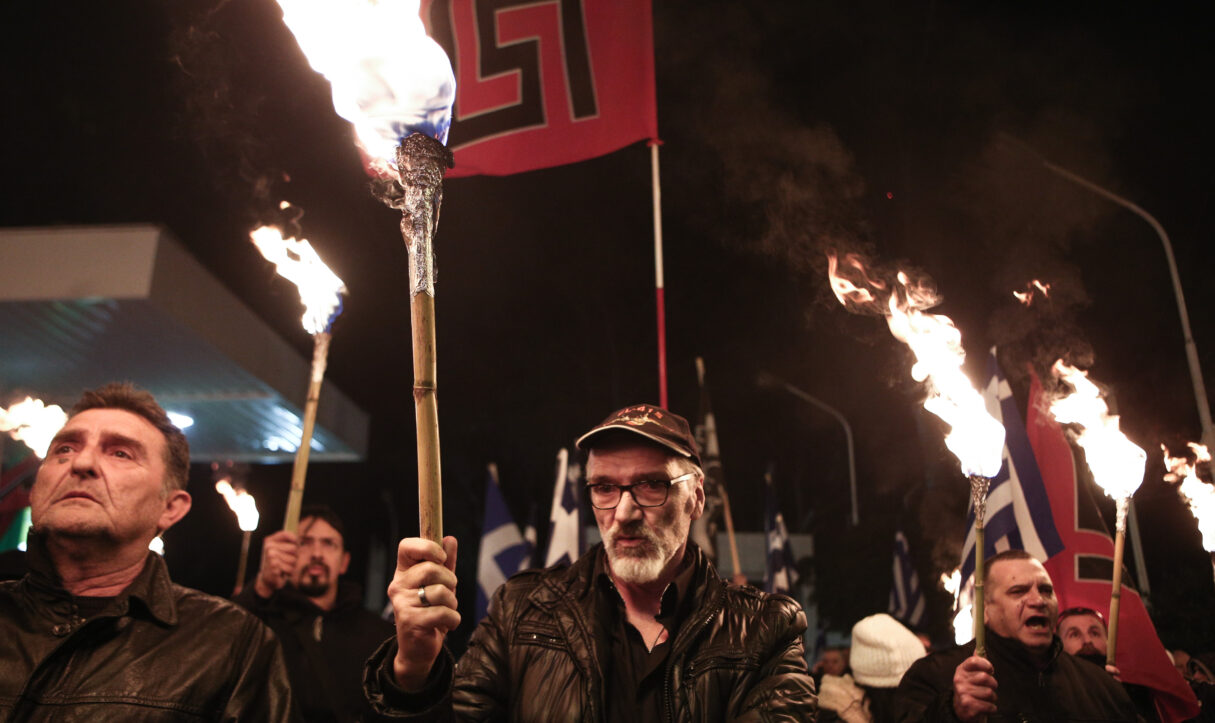In early June 2012, Greece’s ANT1 TV invited Ilias Kasidiaris, a 31-year-old spokesperson for the neo-Nazi Golden Dawn party, onto a panel to discuss that summer’s elections. He would face off against Rena Dourou, a left-wing member of the Syriza party, and Liana Kanelli, a longtime communist politician, among others. Insults soon flew. Kanelli called Kasidiaris a “fascist.”
“You old commie,” he shot back.
Golden Dawn was fresh from a historic performance in elections, pulling in just shy of 7% of the vote. In a couple weeks, Greeks would head back for another round of voting. A month earlier, Kasidiaris had given an interview in which he lashed out at immigrants and refused to condemn Adolf Hitler. His party had loitered on the fringe of Greek politics for decades, carrying out violent assaults on migrants, but Kasidiaris and his comrades had seized anger over the country’s crushing economic crisis to appeal to voters.
When Dourou said Golden Dawn would take the “country back 500 years,” Kasidiaris sprang to his feet and hurled a glass of water at her. Kanelli then tossed a stack of papers at him. Kasidiaris turned, shoved her, and slapped her three times across the face.
Eight years would pass before a Greek court designated Golden Dawn a criminal organization, sentencing Kasidiaris to some 13 years for his role in directing it. Now, fewer than five years after that verdict, courts are granting some former Golden Dawn lawmakers parole and Kasidiaris could soon leave prison on conditional release.
In a statement last week, the the United Movement Against Racism and the Fascist Threat, or KEERFA, called the release of Golden Dawn members “scandalous,” describing the court decisions as “tactics to prepare the return of the Nazi murderers to the political scene” to support the conservative government.
*
The live broadcast of a neo-Nazi slapping a 58-year-old woman over political disagreements proved a charged issue, but not everyone condemned Kasidiaris. The Golden Dawn spokesperson had already built a reputation as one of the party’s most hardline and volatile members. The assault on ANT1 only fed into that image: Within a day, a Facebook page supporting Kasidiaris gained more than 5,000 likes.
When Greeks voted again later that June, the neo-Nazi party repeated its previous success. It would enter parliament for the first time with 18 seats. Kasidiaris and his fellow neo-Nazis seized the chance to use their presence in parliament, a platform like none they had ever had. That October, during one of his first addresses to parliamentarians, Kasidiaris recited a passage from the infamous antisemitic hoax text The Protocols of the Elders of Zion.
By the early fall of 2013, though, Golden Dawn’s luck would begin to sour. Across the year since its first electoral successes, black-clad Golden Dawn hardliners had carried out a slew of violent assaults that often made the nightly news, two party supporters had killed a 27-year-old Pakistani worker named Shahzad Luqman, and a member had fatally stabbed 34-year-old anti-fascist rapper Pavlos Fyssas. That September, police arrested scores of party members, including its founder and several high-ranking parliamentarians, and charged 69 of them with a slate of crimes, including operating a criminal organization, weapons charges, and assaults.
*
Even while facing existential legal problems, Golden Dawn managed to keep up its appeal at the ballot box. It became the third-largest party in the Hellenic Parliament in 2015, and it didn’t lose its shine among voters until July 2019, when it failed to gather enough support to return to parliament.
In October 2020, after a more than five-year trial, a Greek court designated Golden Dawn a criminal organization, banning it, and sentenced many of its former members, including Kasidiaris, to prison. “Of course, we were glad,” said Yonous Muhammadi, coordinator of the Greek Forum of Refugees. “He and his colleagues had attacked many people. We were happy that a criminal was in jail, but we knew that these problems were not finished.”
Meanwhile, for someone convicted of playing a leading role in a neo-Nazi criminal ring, the now 44-year-old Kasidiaris has remained alarmingly active in politics outside the prison walls. Since 2020, he has founded a new far-right party, Greeks for the Fatherland, watched on as a court barred that party from elections, and changed its name to the National Party – Greeks. He has directed his supporters to help vault yet another far-right party into parliament, published articles and press releases, and maintained a monetized YouTube page with nearly 150,000 subscribers. He has won a seat on the Athens Municipal Council and resigned from it.
*
Kasidiaris has also found time to repeatedly apply for a conditional release from prison. Prosecutors had until recently opposed his release, citing the severity of the crimes the court convicted him of and pending charges for electoral fraud. That changed in late June, when an appeals court prosecutor recommended the court release Kasidiaris. If the court agrees, Kasidiaris will have mandatory monthly check-ins at a police station and won’t be allowed to travel outside the country.
In a statement to Greek media, three lawyers who represented Egyptian fishermen Golden Dawn members attacked in 2012 said “any thought of releasing Kasidiaris [is] provocative and dangerous for society.”
People forgot about the past.
In effect, Anna Stamou of the Muslim Association of Greece explained, releasing convicted Golden Dawn members will “put them back in the game.” She added, “People forgot about the past. It’s very concerning. We will have to live it again, but the solidarity movement is more alert now.”
*
If the court releases him, Kasidiaris won’t be the first convicted Golden Dawn member to return to the outside world. In July, a court ordered the release of former Golden Dawn parliamentarians Ilias Panagiotaros and Christos Pappas, both serving 13-year sentences. Even party founder Nikolaos Michaloliakos briefly secured conditional release last summer before the court reversed it.
Nearly five years ago, the conservative New Democracy government hailed the court’s decision to ban Golden Dawn as a landmark ruling and a blow to fascism. Greek Prime Minister Kyriakos Mitsotakis publicly celebrated the ruling. “Democracy won today,” he said in a statement at the time, adding that he was “proud of the unwavering stance of our party that made the political and social marginalization of Golden Dawn its strategic goal.”
In the 2023 elections, three far-right parties gained enough votes to enter parliament. One, the Spartans (Spartiátes), had direct links to Golden Dawn and enjoyed Kasidiaris’s endorsement. A court recently annulled the election of three Spartan parliamentarians, deciding that Kasidiaris had acted as the party’s shadow leader.
Meanwhile, critics accuse the ruling New Democracy party of catering to the far right by making a crackdown on migration a centerpiece of its policy. Earlier this year, the government appointed former far-right activist Makis Voridis as migration minister. When Voridis resigned earlier this year amid allegations of involvement in a far-reaching embezzlement scandal, another hardline far-right politician, Thanos Plevris, took his place.
According to Muhammadi of the Greek Forum of Refugees, the bigger far-right threat now comes from the government’s hardline migration policies rather than the release of Golden Dawn members. “The views of Golden Dawn and the far right were integrated into the policy of the right-wing government,” he said. “It’s just gone from attacks in the streets to attacks through policy.”
*
Meanwhile, the release of Golden Dawn members leaves many anti-racist activists and migrant rights advocates wondering what it will mean in real terms. Though attacks are less visible than in the past, hardline groups and anti-migrant violence remain a concern. In 2023, the Racist Violence Recording Network watchdog documented 158 attacks, the highest level since 2015.
Earlier this year, a leaked police report detailed the activities of six far-right groups, including the breakaway Golden Dawn Youth Front and the Hellenic Socialist Resistance, reportedly led by a former Golden Dawn member named Antonis “Periandros” Androutsopoulos. In May, police arrested dozens of members of the far-right Nationalist Youth of Thessaloniki, accusing them of robberies, recruiting minors into criminal activity, and racist violence.
During the height of Golden Dawn’s violence, Javed Aslam, president of the Pakistani Community of Greece advocacy group, used to collect testimony from victims, help them file police reports, and keep a tally of the number of incidents. He said his organization documented more than 700 anti-immigrant assaults linked to Golden Dawn before its conviction. “It’s unbelievable in a European country,” he said. “Of course, the leaders were planning the attacks. This is very dangerous. Once again, they could plan [attacks] on immigrants and other people. This is bad news.”
Top photo: Golden Dawn supporters hold lit torches during a far-right rally in Athens on Feb. 3, 2018 (Nick Paleologos)














